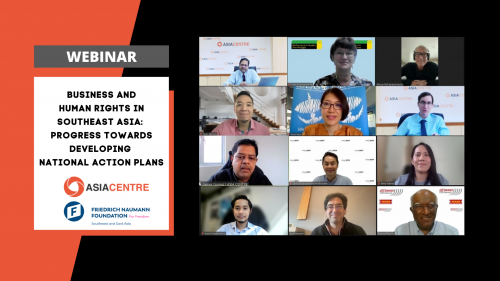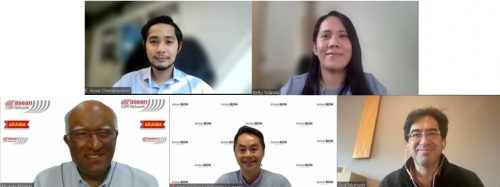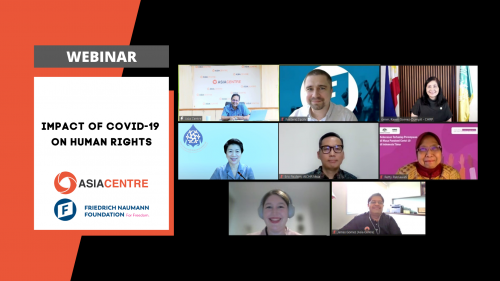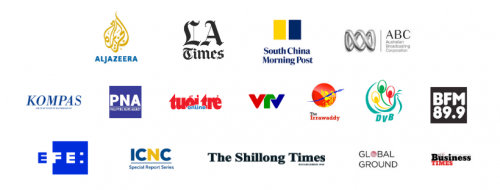
While welcoming the uptake of the BHR agenda across Southeast Asia, panelists in the online forum: ‘Business and Human Rights in Southeast Asia: Progress Towards Developing National Action Plans’(NAPs) emphasised gaps in advocacy on business and human rights across the region. Collectively they noted the need for more stakeholder participation from parliamentarians, business organisations and other non-governmental organisations in NAPs development processes.
The event, co-convened by Asia Centre and the Friedrich Naumann Foundation for Freedom, was held on 15 December 2021, 10.00 AM – 4.00 PM Bangkok Time, to mark the launch of the joint publication: ‘Business and Human Rights in Southeast Asia: Developing National Action Plans’. The event focused on identifying the way forward for the progressive adoption of NAPs in the region.

In welcoming speakers and participants at the start, Moritz Kleine-Brockhoff, Head of Regional Office Southeast and East Asia, Friedrich Naumann Foundation For Freedom, noted that a decade after the adoption of the United Nations Guiding Principles (UNGPs) on BHR there has been an uptake of the UNGPs in Southeast Asia.

This was also highlighted by Dr. Robin Ramcharan, Executive Director, Asia Centre, who presented the key findings of the book. He said that countries in the region have been undergoing, albeit slowly, NAP-development processes in the past few years, following the footsteps of Thailand, which adopted one in 2019, and other Asian countries. Hence, the BHR and NAPs are becoming part of a widening human rights architecture in the region, though progress has been slowed down by political certainty in places like Indonesia and Malaysia and also by the current COVID-19 pandemic.
He noted further key findings of the book, namely: that regional NAPs development still faces challenges in that key stakeholders, notably parliamentarians and business organisations, have not yet been involved in NAPs processes; that there has been a lack of awareness and interest in the BHR agenda among these two sectors; that NAPs must be better aligned with international human rights standards; that through language that is closely aligned with international human rights instruments and best practises, NAPs can play a role in deepening a culture of human rights and democracy in the region, which has seen a regression in both areas in the last decade. NAPs are tools to hold both States and their businesses accountable.
These points were echoed across two panels of experts. The first panel, from 10 AM to 12 PM on ‘The State of NAPs Development in Southeast Asia’ was joined by Paolo Zamora, Programme Manager, Council of Asian Liberals and Democrats and Vicky Bowman, Head of the Myanmar Centre for Responsible Business. Tricia Yeoh, CEO, Institute for Democracy and Economic Affairs, moderated the panel.

The second panel, from 2 PM to 4 PM was a roundtable discussion ‘Business Organisations and NAPs: Prospects for Advancing the BHR Agenda’. It was joined by Betty Yolanda, Asia Regional Manager, Business and Human Rights Resource Centre, Thomas Thomas, CEO at ASEAN CSR Network, Edmund Bon Tai Soon, Lawyer, AmerBON, Saul Takahashi, Asia Centre Advisory Board and Professor of Human Rights and Peace Studies at Osaka Jogakuin University. Husai Chantarawirod, Regional Programme Officer, Regional Office Southeast & East Asia, Friedrich Naumann Stiftung, moderated the discussion.

Echoing important elements of NAP development that are treated in the book, both panels pointed: the need for greater inclusivity and transparency in the development of NAPS, which must involve parliamentarians in the drafting and monitoring of NAPs; setting up strong mixed regulatory frameworks on BHR in addition to providing incentives for Business Organisations (BOs); and the inclusion of Civil Society Organisations (CSOs) as well as National Human Rights Institutions (NHRIs) as key stakeholders in the NAPs development processes to better advance national BHR agendas. The book’s Chapter 2 by James Gomez and Robin Ramcharan of Asia Centre noted these challenges to the uptake in the UNGPs in the region.
Speakers acknowledged that NAPs processes are rightly Executive-driven but pointed to the need for greater inclusivity of stakeholders, notably parliamentarians who can hold governments to account in upholding their human rights obligations. Chapter 3 of the book by Paolo Zamora and Francis Abaya of CALD drew attention to the missing role of Parliamentarians.
The lack of interest and understanding of BHR among BOs have resulted in their low involvement in implementing NAPs. Having NAPs as a starting point, future BHR agendas could aim at offering a ‘smart mix’ of regulations that already exist for BOs along with guidelines on voluntary action that could be made. Chapter 4 of the book by Thomas Thomas for IDEAS treats the reluctance of BOs to engage on the BHR agenda.
Panelists, echoing the book’s findings, pointed to the need to be as inclusive as possible and to involve CSOs and NHRIs in National Baseline Assessment (NBAs) to ensure a comprehensive assessment of the needs of each jurisdiction. The lack of consultation can lead to the exclusion of critical issues that feature across all countries including environmental degradation, the rights of indigenous peoples, and the protection of human rights defenders – among other issues that CSOs and NHRIs have brought up. Gender issues are often excluded from consideration.
 In his Closing Remarks, Dr. James Gomez, Regional Director, Asia Centre said there is a need for greater awareness of and training on the BHR agenda and how stakeholders can effectively contribute to NAP development processes. This calls for national and regional awareness building and for the development of toolkits to better guide small and medium size businesses, which are the backbone of most economies. The concluding Chapter 5, by Asia Centre, summarises pathways for future action for parliamentarians and for better engaging BOs.
In his Closing Remarks, Dr. James Gomez, Regional Director, Asia Centre said there is a need for greater awareness of and training on the BHR agenda and how stakeholders can effectively contribute to NAP development processes. This calls for national and regional awareness building and for the development of toolkits to better guide small and medium size businesses, which are the backbone of most economies. The concluding Chapter 5, by Asia Centre, summarises pathways for future action for parliamentarians and for better engaging BOs.
The discussion and the book are part of Asia Centre’s ongoing work on National Human Rights Institutions and BHR in Southeast Asia. They were follow-ups to the Centre’s 3rd International Conference on ‘Business and Human Rights: Holding Governments Accountable in Asia’ in 2018 and to its previous work, Business and Human Rights in Asia: The Duty of States.
‘Business and Human Rights in Southeast Asia: Developing National Action Plans’ can be downloaded from here. The event’s live stream recording for panel 1 can be seen here, panel 2 can be seen here.
Asia Centre works on business and human rights, among others. If you would like to collaborate with the Centre, send an expression of interest to contact@asiacentre.org.



